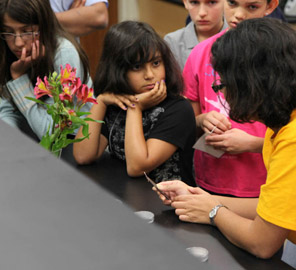Middle School Girls Gained Real-world Science Skills at Pollen Power! Camp
Nearly 30 girls attended the Institute for Genomic Biology’s weeklong summer camp that is devoted to the science of pollen
 Middle school girls learned that pollen does a lot more than help flowers reproduce at Pollen Power Camp!, a weeklong summer camp hosted by the Institute for Genomic Biology (IGB) at the University of Illinois at Urbana-Champaign.
Middle school girls learned that pollen does a lot more than help flowers reproduce at Pollen Power Camp!, a weeklong summer camp hosted by the Institute for Genomic Biology (IGB) at the University of Illinois at Urbana-Champaign.
“I didn't even know pollen was that interesting,” said 12-year-old Kaylyn Johnston of Urbana. “I thought it was just something in flowers.”
From July 8–12, 27 campers studied past and future plant responses to climate change using pollen, toured state-of-the-art campus research labs and facilities, conducted real-world pollen research, and created video presentations using a green screen and teleprompter.
“This camp is a one-of-a-kind opportunity for girls of this age group to gain first-hand experience working in a research environment alongside female mentors and role models,” said Lisa Ainsworth, USDA ARS, Associate Professor of Plant Biology at Illinois and member of the Genomic Ecology of Global Change (GEGC) research theme at Illinois. “These girls tackled real-world projects related to real-world issues, including rising CO2 and O3 levels’ effects on the climate and plants we depend on for food, fuel and fiber.”
Using the IGB’s cutting-edge biological microscopy and image analysis resources, the campers studied how different microscopy techniques capture the pollen’s shape and surface texture. Their research was based on a paper published in PLOS ONE (Article ID: 0039129), a peer-reviewed journal, by Mayandi Sivaguru (Assistant Director) and Glenn Fried (Director), of Core Facilities at the IGB.
“Graduate students currently using these high-end microscopes for their ongoing research took time to show these girls how these microscopes work and showed how the pollen data is collected,” Sivaguru said. “They learned how campus facilities can aid in graduate research, how these microscopes and the people here on campus can help graduate students to be more efficient.”
Bella Chapman, a 12-year-old from Mahomet, said she enjoyed working in a laboratory setting. “I thought it was really interesting how they cut out the wax and put it on a slide,” she said. “I also thought it was really interesting to look at the microscope.”
That’s the point, said Sivaguru, to help to pique their interest in science.
“This camp was an extraordinary opportunity for these girls to realize not only the potential of this scientific field but also their own potential as students and future scientists,” Ainsworth said. “Through this camp, they discovered that they can succeed in a research environment, a lesson we hope they will carry with them throughout their education and as they, hopefully, pursue scientific careers.”
In addition to conducting research, the campers visited carnivorous plants in a university greenhouse, participated in a photo scavenger hunt around campus, and created glowing, fiber-optic flowers.
This year’s camp was the first of five, funded in part by the National Science Foundation (NSF) under Grant No. IOS-1238030, “Genetic and Genomic Approaches to Understand and Improve Maize Responses to Ozone” and in part by the IGB.
This year several campers received scholarships provided by the NSF and IGB to attend Pollen Power! To sponsor future campers, contact IGB’s Director of Development and Outreach Melissa McKillip at mmckilli@igb.illinois.edu or (217) 333-4619. Also contact McKillip to be added to the mailing list for future camp and outreach activities.
"This camp would not have been possible without the dedication of countless volunteers and university staff,” said Andrew Leakey, an Assistant Professor of Plant Biology at Illinois and member of the GEGC research theme at the IGB. “Thank you to everyone who lent their time and talent to make this camp a success. And, especially, thank you to the campers—they also made Pollen Power! a success."
By:
Photos By:




